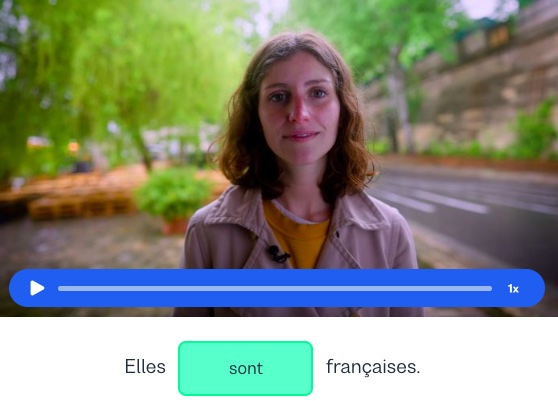The French Verb Être and Its Conjugations
We’ll look at the French verb être and how it is conjugated in some common tenses.
I want to learn...
Être is one of the most common verbs in French, making it very important to learn! The French verb être is the equivalent to the verb “to be”. It’s essential for talking about how you feel, as well as if you want to describe both people and things.
Imagine you’re talking to someone you know and they ask “ça va ?” or “how’s it going”.
You might reply “je suis fatigué !” or “I am tired!” if you’ve had a long day. Or perhaps you’re excited about a new restaurant that’s opened up in the area, in which case you’d say: “je suis ravi d'essayer le nouveau restaurant !”
in this article we will look at singular and plural forms of être, and how this affects the conjugation. We will also explore its conjugations in the present tense, as well as how to use it in the past and future.
The French verb être
Firstly, it’s important to remember that être is an irregular verb. This means that its conjugations don’t follow a standard pattern. You’ll have to memorize all of the different conjugations for each gender, tense, and mood in French. We hope that with this guide, however, you’ll be able to do just that!
Conjugations of être in present indicative
You’ll probably most frequently find conjugations of être in the present indicative. It’s a combination of the present tense and the indicative mood, meaning that we’re talking about something happening in the present, and the indicative mood is the standard grammatical mood you’ll find in French.
It just means that you’re stating something as a fact. You can use être to describe the state of a person, such as a trait of character or their emotions.
Let’s look at some examples:
- Je suis grande. (I am tall.)
- Je suis contente. (I am happy.)
In the above examples, the conjugation of être is “suis”, because it matches the subject pronoun “je”, or “I”. We’ll look at a table below which shows all of the different conjugations of être for subject pronouns in the present indicative.
Present indicative of être
| Subject pronoun + conjugation in French | Subject pronoun + conjugation in English |
|---|---|
| Je suis | I am |
| Tu es | You are |
| Il/Elle/On est | He/she/one is |
| Nous sommes | We are |
| Vous êtes | You are |
| Ils/Elles sont | They are |
Singular conjugated forms of être
We are going to see that all the singular conjugated forms of être in the present tense end with either “s” or “t”. However, when we speak, we don’t pronounce these last letters!
Check out the examples below:
- Je suis contente. (I am happy.)
- Tu es fatigué? (Are you tired?)
- Elle est impatiente (She is impatient.)
When do we use ils?
We use ils when we talk about a group of men. We also use it when we refer to a mixed group of men and women.
For example:
- Marie et Sophie = Elles sont françaises.
- Pierre et Thomas = Ils sont français.
- Marie, Pierre, Sophie et Thomas = Ils sont français.
How does être change with tense?
We’ve looked at être in the present tense, but how does the verb change when it sits in a different moment in time, like the past or the future? Let’s explore this further…
You’ll probably want to be able to talk about what people and objects used to be, as well as what they are now. If you want to talk about something which happened once (such as a one off event), then you use the passé composé – the past tense.
Here’s a table to help you memorize the verb in this tense:
Compound past tense of être
| English “to be” | French être conjugation |
|---|---|
| I was | J’ai été |
| You were | Tu as été |
| He/she/one was | Il/elle/on a été |
| We were | Nous avons été |
| You were (plural) | Vous avez été |
| They were (masculine/feminine) | Ils/elles ont été |
What happens if you want to talk about something which happened in the past, but are continuous events rather than events that happened once? You’ll need the imperfect tense to help you do that. Let’s look at conjugations of imperfect être:
Imperfect of être
| English “to be” | French être conjugation |
|---|---|
| I used to/was | j’étais |
| You used to/were | tu étais |
| He/she/one used to/was | il/elle/on était |
| We used to/were | nous étions |
| You used to/were (plural) | vous étiez |
| They used to/were (masculine/feminine) | ils/elles étaient |
What happens if you want to talk about something that might happen to someone in the future? Let’s have a look at a conjugation table for the simple future:
Simple future of être
| English “to be” | French être conjugation |
|---|---|
| I will be | je serai |
| you will be | tu seras |
| he/she/one will be | il/elle/on sera |
| we will be | nous serons |
| you will be (plural) | vous serez |
| they will be (masculine/feminine) | ils/elles seront |
Wrapping-up on the French verb être and its conjugations
We hope that you now have a better idea of how to use the irregular French verb être, or “to be”.
It’s useful in so many situations where you need to describe traits of character, emotions, or events that have happened to people in the past or that will happen in the future.
Just remember that because the verb is irregular, you’ll need to learn each of these conjugation tables by heart – but don’t worry, it will come with regular use and practice!
Want to practice French grammar your way?
Whether you want to learn French quickly or if you want to take your time, Busuu’s free online courses are easily accessible for a quick vocabulary practice or a thorough study on French grammar!

